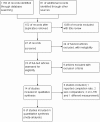Does phone messaging improves tuberculosis treatment success? A systematic review and meta-analysis
- PMID: 31937260
- PMCID: PMC6961375
- DOI: 10.1186/s12879-020-4765-x
Does phone messaging improves tuberculosis treatment success? A systematic review and meta-analysis
Abstract
Background: Compliance to anti-TB treatment is crucial in achieving cure and avoiding the emergence of drug resistance. Electronic health (eHealth) interventions are included in the strategy to end the global Tuberculosis (TB) epidemic by 2035. Evidences showed that mobile messaging systems could improve patient adherence to clinic appointment for diagnosis and treatment. This review aimed to assess the effect of mobile-phone messaging on anti-TB treatment success.
Methods: All randomized controlled trial (RCT) and quasi-experimental studies done prior to August 26, 2019 were included in the review. Studies were retrieved from PubMed, EMBASE, Cochrane and ScienceDirect databases including, grey and non-indexed literatures from Google and Google scholar. Quality of studies were independently assessed using Cochrane Risk of Bias Assessment Tool. A qualitative synthesis and quantitative pooled estimation were used to measure the effect of phone messaging on TB treatment success rate. PRISMA flow diagrams were used to summarize article selection process.
Results: A total of 1237 articles were identified, with 14 meeting the eligibility criteria for qualitative synthesis. Eight studies with a total of 5680 TB patients (2733 in intervention and 2947 in control groups) were included in meta-analysis. The pooled effect of mobile-phone messaging revealed a small increase in treatment success compared to standard of care (RR 1.04, 95% CI 1.02 to 1.06), with low heterogeneity (I2 = 7%, p < 0.0002). In the review, performance, detection and attrition biases were reported as major risk of biases.
Conclusions: Mobile-phone messaging showed a modest effect in improving anti-TB treatment success; however, the quality of evidence was low. Further controlled studies are needed to increase the evidence-base on the role of mHealth interventions to improve TB care.
Protocol registration number: CRD420170744339. http://www.crd.york.ac.uk/PROSPERO/display_record.php?ID=CRD42017074439.
Keywords: Mobile phone; Text messaging; Treatment success; Tuberculosis.
Conflict of interest statement
The authors declare that they have no competing interests.
Figures







References
-
- World Bank . Mobile cellular subscriptions, ITU, World Telecommunication/ICT Development Report and database. 2016.
-
- ITU . ICT facts and figures. Geneva: International Telecommunications Union; 2010.
Publication types
MeSH terms
LinkOut - more resources
Full Text Sources
Medical

